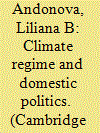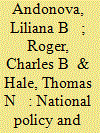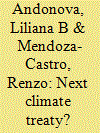| Srl | Item |
| 1 |
ID:
085404


|
|
|
|
|
| Publication |
2008.
|
| Summary/Abstract |
The literature on climate cooperation focuses primarily on intergovernmental institutions and national policies. Few studies have examined the 'second image reversed' question: what is the impact of the international climate regime on domestic politics? This article examines the impact of the Kyoto Protocol on climate politics in Russia. Russia is an important case study both from a theoretical and policy perspective. Analytically, the case provides an opportunity to assess alternative theories of regime impact, given Russia's early scepticism about climate change and insistence on unrestrained economic growth. The study finds that the Kyoto Protocol influenced political interests in Russia first and foremost through the redistribution of resources and potential payoffs, but also through more subtle mechanisms such as capacity building and the diffusion of economic assessments. The result was a realignment of powerful domestic interests in a direction that has supported the main institutions of the climate regime and pushed for its implementation. Documenting the domestic political impacts of the Kyoto Protocol has policy implications for the conditions under which Russia and other large emerging markets focused on growth might undertake obligations to strengthen climate cooperation.
|
|
|
|
|
|
|
|
|
|
|
|
|
|
|
|
| 2 |
ID:
155487


|
|
|
|
|
| Summary/Abstract |
Many scholars and policymakers see transnational governance as a substitute for lackluster national and international policies, particularly in the context of intergovernmental gridlock or limited state capacity. The bulk of the literature explains sub- and non-state actors’ participation in transnational initiatives as a product of, on the one hand, micro-level incentives and, on the other, diffusion processes that create and spread normative and market-based pressures. We argue that such theoretical perspectives overlook the dynamic relationship between national policies and transnational governance. First, we argue that ambitious national policies positively affect sub- and non-state actors’ participation in transnational governance. Second, we posit that domestic institutions condition the effects of micro-level incentives and transnational pressures on participation in transnational governance. We test these claims in the climate regime, using an original dataset that, for the first time, measures cross-national participation in transnational climate initiatives across jurisdictions. The results support our expectations. They therefore suggest that we should understand national policies and transnational governance as complements, rather than competitors, to one another. Finally, by showing how and when national policies affect participation in transnational initiatives, we identify important scope conditions for their significance in addressing climate change.
|
|
|
|
|
|
|
|
|
|
|
|
|
|
|
|
| 3 |
ID:
084676


|
|
|
|
|
| Publication |
2008.
|
| Summary/Abstract |
Scholars and policy pundits have advanced more than thirteen different designs of a climate change treaty to succeed the Kyoto Protocol. Each of these designs claims to correct the defects of the current agreement. But what kind of a treaty is likely to pass the test of international and domestic politics and negotiations? Can we learn something about the hurdles and opportunities for climate cooperation from negotiations simulations in the classroom? The paper engages these questions by analyzing an experimental course design organized around simulated negotiations of the next climate change treaty. Unlike classroom simulations which rely on hypothetical scenarios, this course sought to approximate actual domestic and international constraints within which countries negotiate. The paper details the structure of the course, the ways in which it familiarizes students with domestic and international climate politics, and the components of the negotiations module. The analysis examines the pedagogical impact and policy learning associated with the simulation and draws conclusions about the broader applicability of this approach.
|
|
|
|
|
|
|
|
|
|
|
|
|
|
|
|